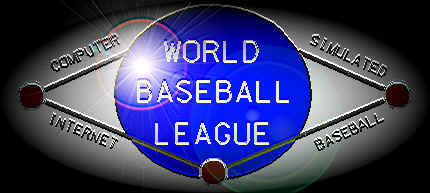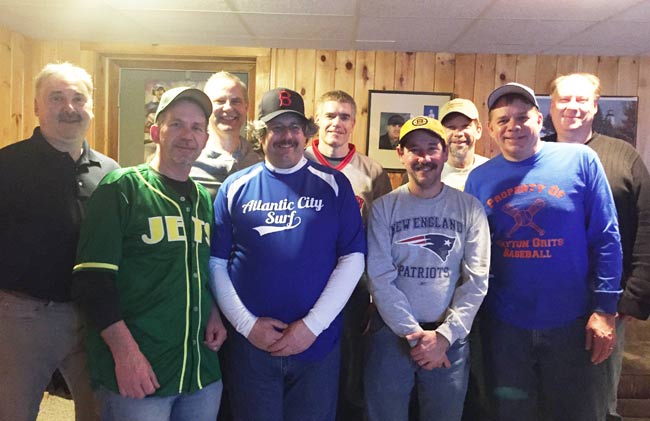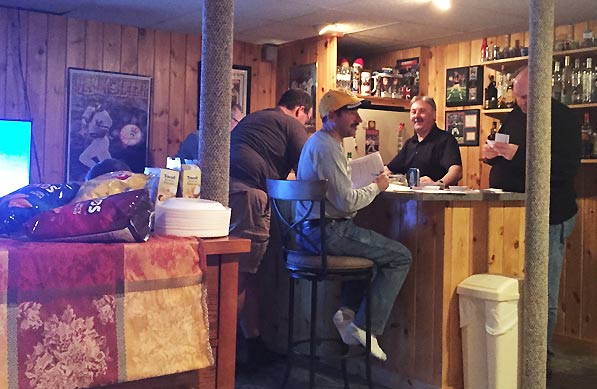Vol. IV, Issue #3 -
March 2016
Strat-o-matic Baseball League
Commissioner Interviews PART VI
**
"World Baseball League" – Jeff Chaput **
(It is time to meet more commissioners from the various
SOM baseball leagues that are
out there, as these leagues are a key foundation of the SOM
world. We
thank Jeff for joining us and offering to share about a league
that has
existed for almost 40 years—another league with history and
traditions.)
(Notes
from the Wolfman:
The World Baseball League, or WBL, has been around since 1977.
Currently they have two divisions, one known as the American and
the other as the National. They keep their players from year to
year and have an annual draft of the eligible players not owned
by any team. With just 14 teams in the league, there are usually
good pickings. Eligibility is based on a minimum amount of plate
appearances for the positional players and innings pitched for
the starters and relievers. Over half of the current owners have
been involved with the WBL since the 1980s. Most of the
remaining managers arrived in the 1990s, with the exception of
two who came into the league in the last five years. Okay,
Commissioner Chaput, all our members are now excited to hear
about your WBL, tell us more.)

Wolfman:
Jeff, I want to thank you for accepting my invitation to speak to
us. Welcome to the Ultimate Strat Baseball Newsletter.
Jeff:
Thank you, the
guys in the league think it is cool that the league is being
recognized like this.
Wolfman:
Jeff, I normally ask questions first to give our members a chance to
meet you and know a little bit about your background before we
talk about Strat. So first, which part of the world do you live
in right now and is this where you grew up? So then, this is
the area where your league meets in then, yes?
Jeff:
I live in a
small town in Western Massachusetts. We are located in the
Berkshires, which most people have heard of. This is where we
all grew up and still live. One member went off to join the Navy
in the 80s and then lived in San Diego for about 25 years, but
he recently returned to the area.
Wolfman:
When you were younger, did you actually play baseball and, if so,
what was your best position?
Jeff:
Yes, I played
baseball when I was younger, as did every member of our league.
We all played at least through Little League, with a couple
through Babe Ruth, and a couple more played through high school.
One member also played in college. My best position was third
base, though I also pitched.
Wolfman:
Which MLB team did you root for when you were younger and are you
still a fan of this team? Are there any ball players you really
followed or were your favorites?
Jeff:
I followed the
Red Sox growing up, still do, as do most members of our league.
Since we are located in Western Massachusetts, we are by the New
York border and also list four Yankee fans among our owners. My
favorite player growing up was Carl Yastrzemski, but was pretty
much a fan of all the Sox players of that era, such as Rico
Petrocelli, Fred Lynn, Jim Rice, and George Scott, just to name
a few.
Wolfman:
How did you hear about SOM Baseball? When did you first begin to
play the game?
Jeff:
I saw an ad for
Strato in a magazine, don't remember which one, though I can
narrow it down to Sport, Sports Illustrated, or
The Sporting News. I started playing the game in 1973 with a
starter set; I believe it had only six or eight teams.
Wolfman:
What is your history participating in leagues (face-to-face or
computer-based)? Have you ever played in any tournaments?
Jeff:
We started the
WBL in the winter of 1977; that was face-to-face. A few of us
joined a play-by-mail league in the 1980s (in addition to the
WBL) but really did not enjoy it. We all lasted one season in
the play-by-mail league. A few of us attended tournaments when
they first started in the 80s. We went to the ones located
around Boston.

(The smiling faces of the
members of the WBL during their draft day on March 18th, to
see where Jeff
is, he is in the 1st row to your farest right in the dark blue
shirt and
his brother Matt is in the first row to your left in the green
shirt with their friend Bernie
to the far left in the first throw, these three are what is left
of their original members.)
Wolfman:
How did the WBL come into existence? Where did the name come from
for your league and what is the name of the team you manage?
Can you describe the structure of your league and how
the playoffs work?
Jeff:
We started the
league in the winter of 1977. The impetus came from an article
in Sport magazine about four guys who played a draft
league using another game's cards. It sounded like fun; so my brother,
cousin, another friend, and myself got together and decided to
start our own league. Of the original four, three of us still
play. My brother and cousin are still in the league with me. The
other guy who replaced the original owner who dropped in 1982 is
still in the league. We came up with the name based on the World
Football League and World Hockey Association. We felt we were
challenging MLB; so, we created the World Baseball League. My
team is called the Dayton Grits and actually came from the
article.
We have two divisions of seven teams (American and National), top
four in each make the playoffs. It seemed like the lower seeds
would knock off the higher seeds more often than not, so we
devised a playoff system where 4 plays 3, the winner then plays
the 2nd seed and the winner of that series plays the 1st seed in
the division for the right to go to the World Series. This makes
the regular season more important, plus if a lower seed does
move on, they really have to earn it.
Wolfman:
How do you create your teams? Discuss the rules of your league and
how you build your team (players you keep from year to year
and your draft and trades).
Jeff:
We keep players
year to year. We have limits on at bats and innings pitched for
both starters and relievers. If one of your players does not
qualify for the league due to not making the minimum at bats or
innings, you may still keep him on your roster. Players who do
no meet the minimums are not allowed to be drafted or picked up
during the season. We have a trading deadline of August 1; after
that point, no more trades or pickups. We hold a 12-round draft
prior to the start of each season, all players who qualify for
the league are eligible for the draft, if they are not already
on a team.
Wolfman:
What is your life as the commissioner of WBL like? How much time
does it take? What are your duties? Do you have other officers
in your league?
Jeff:
It takes about
20 minutes a day to run the league, a little more set up time
prior to the start of the season. The way we do it now is
similar to the Strato online game the company has (Editor’s
Note: Baseball 365). After the draft, the owners fill out a
manager tendency sheet; this has all the computer manager
tendencies, plus lineups. I enter those into the game. Each
night I play a day’s worth of games and post the box scores,
stories, and recaps to our website. The guys review them the
next day; they may make changes due to injuries, who they are
playing, etc.
Basically in the late 1980s and early 1990s most members got married
and started to have kids. All of our kids were/are involved in
sports with most of us coaching. We were unable to meet
face-to-face to play anymore, so the computer version saved our
league. We still meet at my house for the playoffs. The games
are played out on the computer, with each guy coaching his own
team. The playoffs normally take us a couple of nights. My
brother assists with some of the setup, as does my son, but we
don't have any other official officers.
Wolfman:
Jeff, you told me you have been the champion of the WBL before.
What type of team do you like to create? What type of team did
you have in your last season?
Jeff:
My normal team
is based on power—I like home runs. I try to get players at all
positions that can hit homers. I had Cal Ripken his entire
career, Alex Rodriguez for most of his. I also had Barry Bonds
during the steroid years, when he set our league record for
homers in a season—86. Bonds also has the lifetime record of 919
home runs. My team last year was kind of on its last legs: Chase
Utley is getting old, as is Josh Hamilton, Matt Holliday, and
Mike Napoli. Right now I am trying to rebuild with Chris Davis
and Kyle Seager. I also always have a deep bullpen with a solid
closer. Over the years I have had Dennis Eckersley, Troy
Percival, and Joe Nathan. Currently, I have Mark Melancon and
Ken Giles in my bullpen.
Wolfman:
When you have had a successful (champion/playoff-bound team) what
were the keys to your success with this team (or teams)? Are
there special strategies you use to build your team? And
special strategies you use when playing your games?
Jeff:
My main
strategies as I stated above is that I like to create a team
that can produce power from any spot in the lineup. I try to put
together a good defense, stay away from 4-rated players if
possible. I never seem to have quality starters so I rely
heavily on my bullpen. In playing games, I tend to go to my
bullpen quicker than most, also since my players usually can hit
homers, they are not good at bunting or hit and run, so I tend
to just swing away.
Wolfman:
We always ask those we interview if they have any tips or advice for
our members that could help them with success with their game
playing.
Jeff:
My main advice
is not to get blinded by names or draft with your heart. We have
some managers who draft on name recognition. This doesn't always
work, as their cards do not always match your perception. We
have an owner that is a huge Yankee fan. He likes to draft
Yankees, a lot of times, higher than they should go. Amazingly,
even with this strategy, he is usually in the playoff hunt each
year.
Wolfman:
Have you ever tried to play in the online baseball leagues that
Strat-o-Matic offers, other leagues (face-to-face or via the
internet)?
Jeff:
Last year, my
son and I joined the online league Strato offers and will
probably do so again this year. This is the only league I
currently participate in. In the 80s and 90s, we had a very
successful Strato football league, but that kind of ended around
the time we switched to computer baseball.

(Another Photo from the
WBL Draft Day as this day is both used to help their managers
build their teams for the new season and to enjoy each other's
company in a festive mood.)
Wolfman:
What do you like about the WBL? What are the members like in this
league from your perspective? What is the key for the longevity
of your league? How do you organize league play—do you have a
day during the week when all the members meet perhaps?
Jeff:
Most of the
members in the league grew up together. We all still hang around
together with our wives and families. When we are at a picnic or
out on the weekend, we always end up talking Strato. Our wives
have learned to live with it. The newer members were coworkers
that heard us talk about the league. So in most cases we have
had a connection prior to their joining the league. We also have
the next generation, as both my son and my cousin's son are in
the league. We did not have an owner change for almost 20 years,
other than through expansion 5 years ago.
One of the owners, who had been in the league since 1984,
dropped out last year after the passing of his wife. The guy who
took over the team ended up winning the championship last year.
We currently get together every year on draft night, then again
for the playoffs. A lot of the owners show up for the playoffs
even if they are not participating. During the year, we end up
getting together in little groups to go to a Red Sox game, watch
the Super Bowl, etc.
Wolfman:
Have you had any special experiences (certain games that stand out
in your mind that you played or series you played) being a
manager in the WBL that were amazing, or very unusual games, or
something you are proud of. Maybe some key trade you made?
Jeff:
When we were
younger and played face-to-face, we had many wild
times—arguments, someone rolling a 12 to win a game, etc. Back
in 1985, we had a team that was trying to clinch a playoff spot
on the last day of the season. His team ended up losing as they
made seven errors, with Ivan Dejesus leading the way with five.
Another famous story was in 1995, a team that had never gone to the
World Series was leading in the top of the ninth. Someone in the
crowd recommended to the owner at bat that he should pinch hit.
So he did, ended up hitting a 3-run home run that turned out to
be the game-winner. It took the losing owner months to get over
that defeat (and years before he got to the World Series) and he
still brings it up every time we get together.
More recently, my son's team was ahead last year by one run in the
bottom of the 9th of game 7, with a chance to go to the Series
on the line. My brother's team was at bat with Nelson Cruz up.
As he pushed the button, he said “this is it, one of us wins or
loses on this.” The crowd then roared as Cruz took the ball deep
to win. As for key trades, I am most proud of getting A-Rod,
using a package of draft picks and Marquis Grissom. My worst
deal is when I sent Nolan Ryan to my brother when he was 34,
thinking it was the end of his career.
Wolfman:
Why do you personally like playing SOM—do you try other baseball
games like SOM?
Jeff:
No we have only
played SOM, never tried anything else. It seems to be realistic;
the players perform as they should. The neat thing is when we
try to analyze how a certain player will fit in your ballpark or
with your team. My ballpark favors lefties, so I try to be on
the lookout for good lefty hitters. Other guys in the league
have set up their parks for righties or as a pitchers park,
which may change your perception of certain players.
Wolfman:
Is there anything else you would like to share with our members
that I didn't ask you before that you think is important to
let them know about?
Jeff:
I think the most
important thing is to have fun. The way Strato is set up now,
you can play so many ways, face-to-face, computer, etc. Find the
way that works best for your league and stick with it. In our
case, we do miss the day-to-day dice rolling, but the computer
allows us to stay in the game, have fun, and the playoffs seem
like old times when we all get together.
Wolfman:
So thanks Jeff for spending time with us. Good Luck in the next
season of the WBL and to another exciting season of play.
Jeff:
Thank you.
Wolfman:
Finally, if a member of the newsletter wanted to contact you or had
some questions for you, is this possible and, if so, what is
the best way to do it? And also what is your league’s website?
Jeff:
Sure, through
this email is the best way to contact me at:
jeffman1313@yahoo.com
And our league
website can be found at:
http://www.wblcheshire.net
Wolfman:
All the best and thank you.
Note: --
To Read the Interview with the Champion of the WBL
from this month's issue,
just click on the link here:
[
WBL Champion Interview
]
================================
(Final
Comments from the Wolfman:
Again, we heard another case through Jeff, how a league has
brought the members and their families together in some special
ways. I believe it is always a beautiful experience when people
co-create an activity that connects them more intimately. So,
if you would like to have your league featured in this section
of our newsletter, please email me— whether you are the
commissioner, a league officer, or just a member—and let’s talk.
You can find my email address at the bottom of this page. I know
there are thousands of leagues out there, and each league has
its own special and unique story to tell. What you might think
is ordinary for your league might inspire a change of how
another league could be played; it’s all good. So, let’s keep
‘em coming in. Thanks, Wolfman Shapiro :-) )